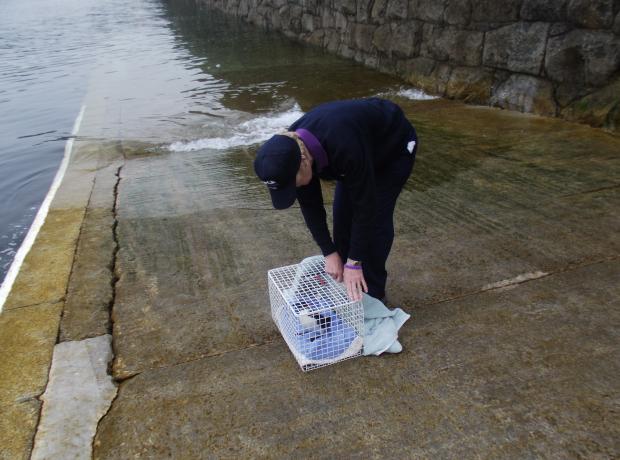Links to vets in Guernsey
Local useful links
Website donated by:
We are pleased to report that 4 of the rescued oiled guillemots found around Guernsey in January are clean from oil and have been rehabilitating on one of our pools.
Lihou, Pegasus, Bob and Rockmount who were all oiled and very poorly when they arrived at the GSPCA have all received a number of washes, treatment, medication, time in an intensive care unit, a lot of fish and have been getting use to being outside over the last few weeks.
With all of the rough and stormy sustained weather recently the GSPCA are bracing for a potentially busy period of sick and injured animals and birds.
Only in the last few hours have two oiled guillemots been rescued and arrived at the Shelter and there are likely to be many more.
The reason we and other coastal animal charities see this increase after stormy weather is that crude oil that has settled on the sea bed gets stirred up and floats to the surface where the birds sadly get coated and then find it difficult to fly, preen, hunt and care for themselves.
After a second spell of rough weather this year the GSPCA has already rescued 4 oiled birds so far today.
The reason we and other coastal animal charities see this increase is that crude oil that has settled on the sea bed gets stirred up and floats to the surface where the birds sadly get coated and then find it difficult to fly, preen, hunt and care for themselves.
We closely monitor the locations of where the birds are found and tidal movements in case they aren't isolated incidents.
With rough weather the GSPCA often finds itself rescuing and caring for oiled birds.
The reason we and other coastal animal charities see this increase is that crude oil that has settled on the sea bed gets stirred up and floats to the surface where the birds sadly get coated and then find it difficult to fly, preen, hunt and care for themselves.
We closely monitor the locations of where the birds are found and tidal movements in case they aren't isolated incidents.
We have had 7 oiled birds in the last week but sadly a Razorbill and 2 Guillemots were to weak to save.
The GSPCA are pleased to hear that the polluntant that killed and injured more than 4,000 birds, called polyisobutene (PIB) between Cornwall and Sussex, and on the Channel Islands can no longer be dumped at sea after a worldwide ban was agreed.
The International Maritime Organisation (IMO) has reclassified PIBs from 2014 which means ships will only be able to wash their tanks and dispose of all PIB residues while in port.
![]()

On the 8th February this year the GSPCA received a Razorbill from Alderney which had been affected by crude oil.
Staff at Alderney Animal Welfare had cared for the bird and done a wonderful job removing the crude oil from the its feathers after being found on the coast of Alderney. If it hadn't been for their staff this bird would certainly have perished.
Today the GSPCA received another oiled bird. This time a Gull was rescued from Chouet and brought into the Animal Shelter.
Although it is not thought to be the PIB (polyisobutene) that has killed thousands of see birds along the south coast of England the GSPCA are on high alert in case of any outbreak.
You may remember only a number of weeks ago an oiled bird was found dead in Alderney due to PIB. Here is some simple advice on what to do if you find sea life affected by this or any oiled substance -
After a call yesterday and a flight this morning the GSPCA received a Razorbill from Alderney which has been affected by crude oil.
Staff at Alderney Animal Welfare have cared for the bird over the last few days and done a wonderful job removing the crude oil from the its feathers after being found on the coast of Alderney. If it hadn't been for their staff this bird would certainly have perished.


